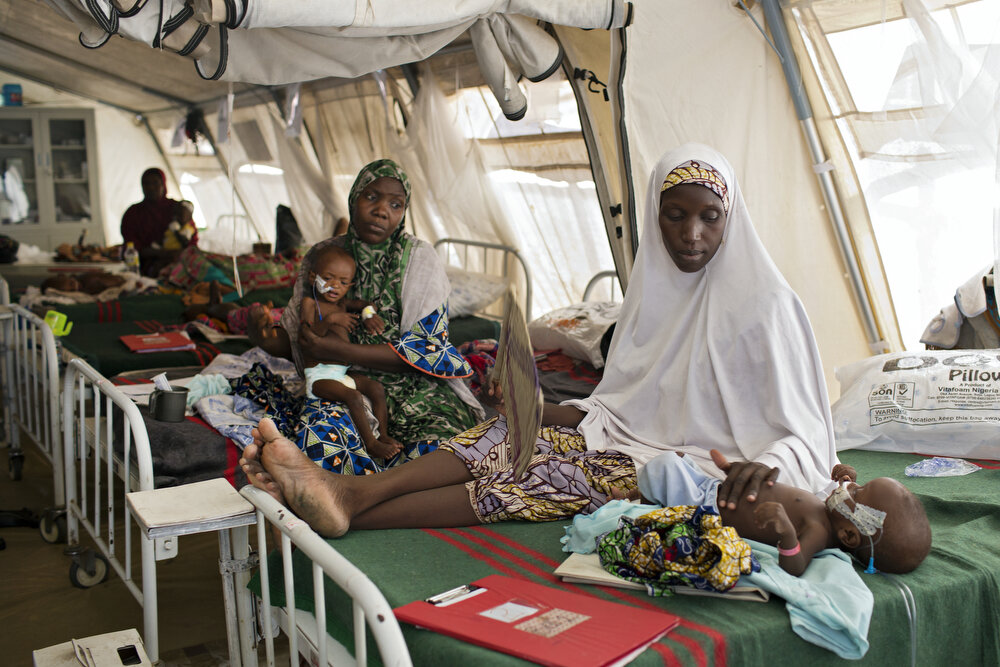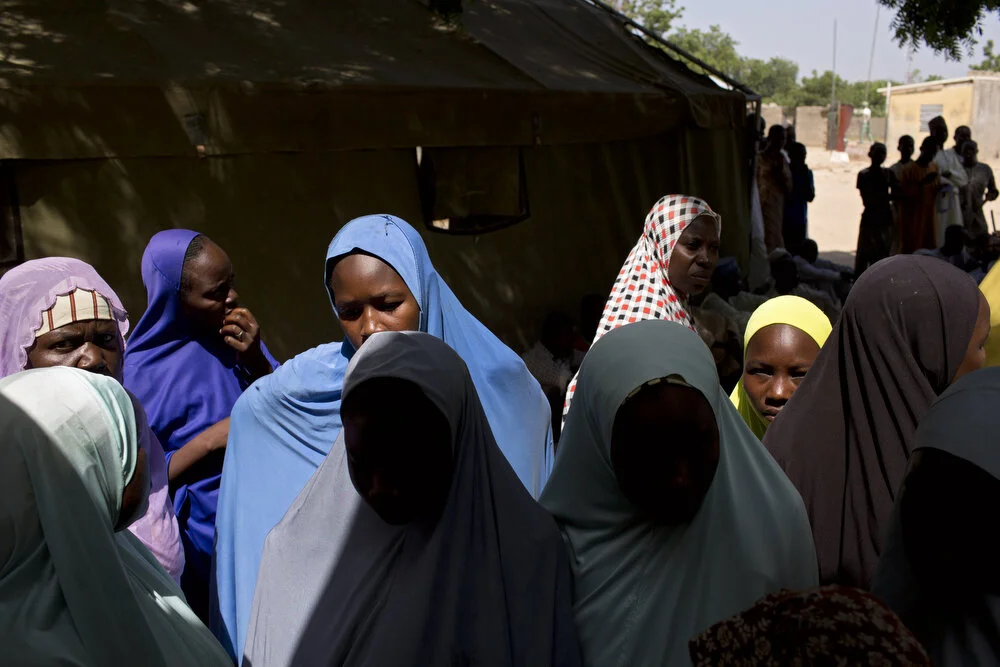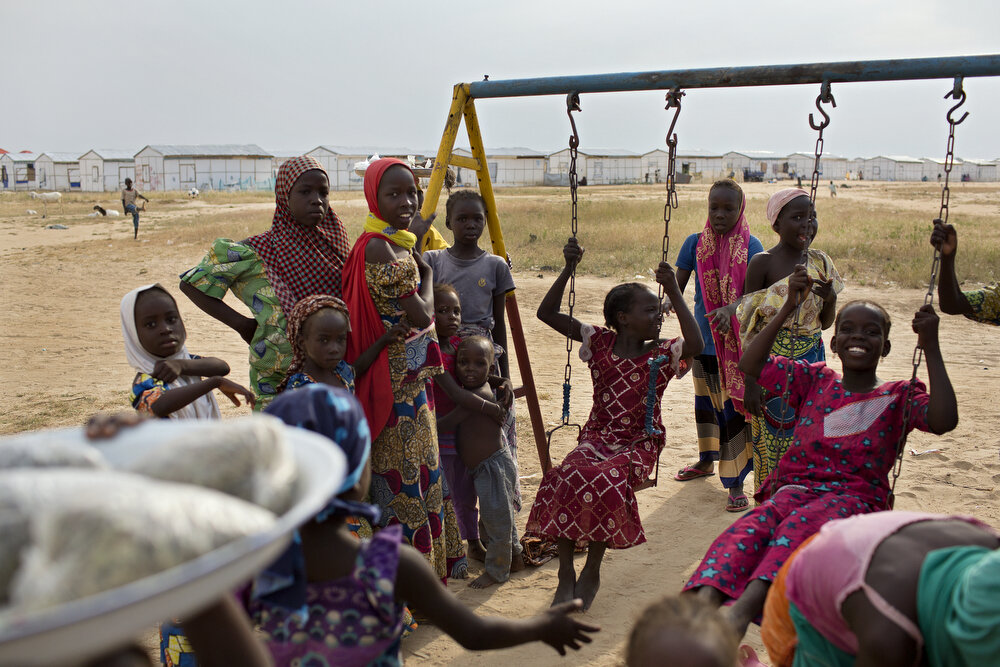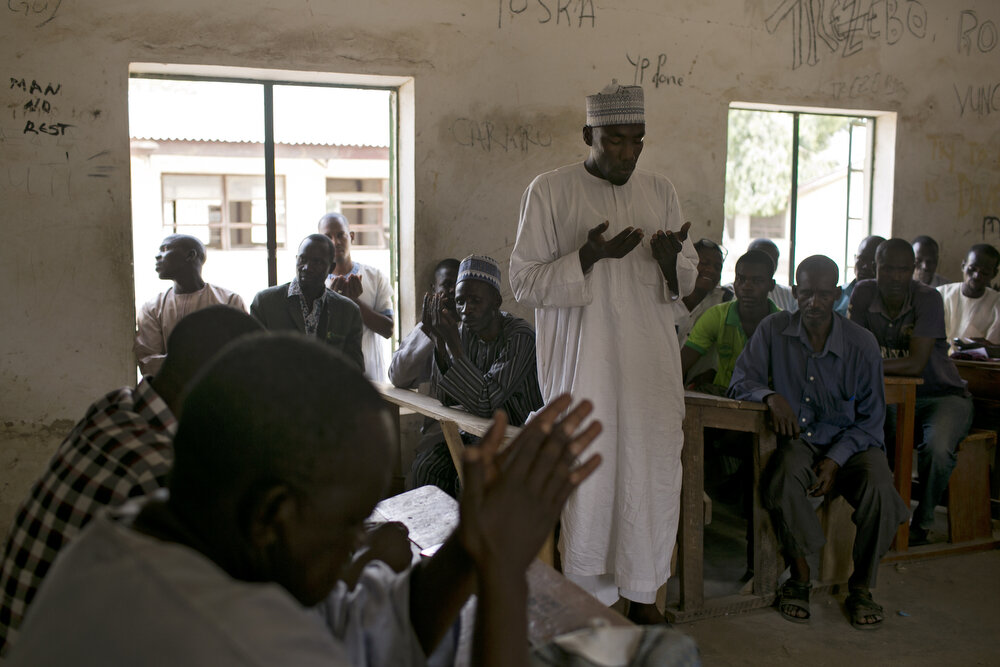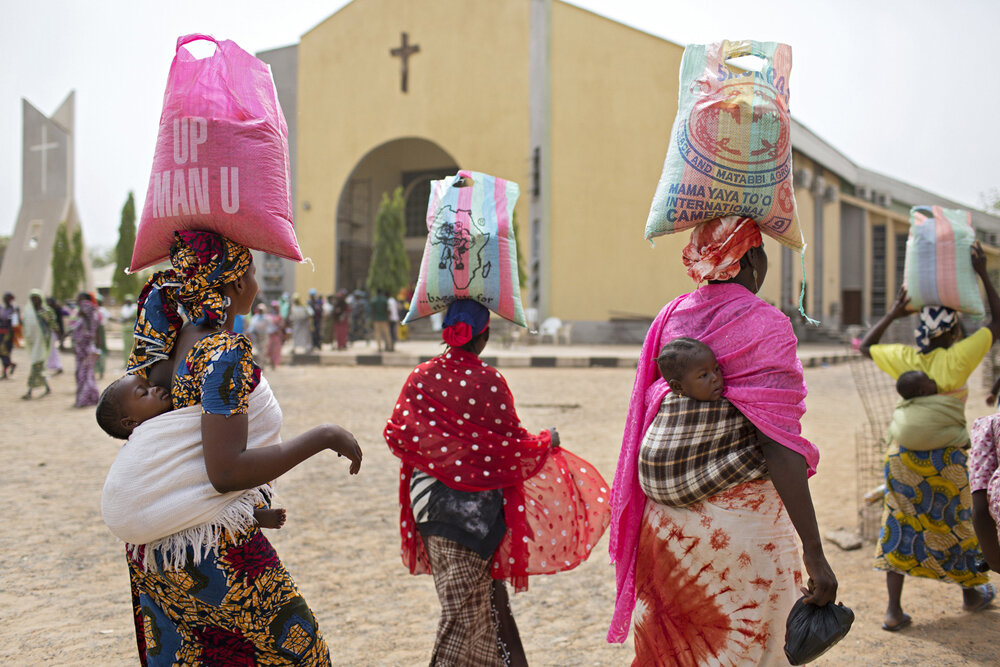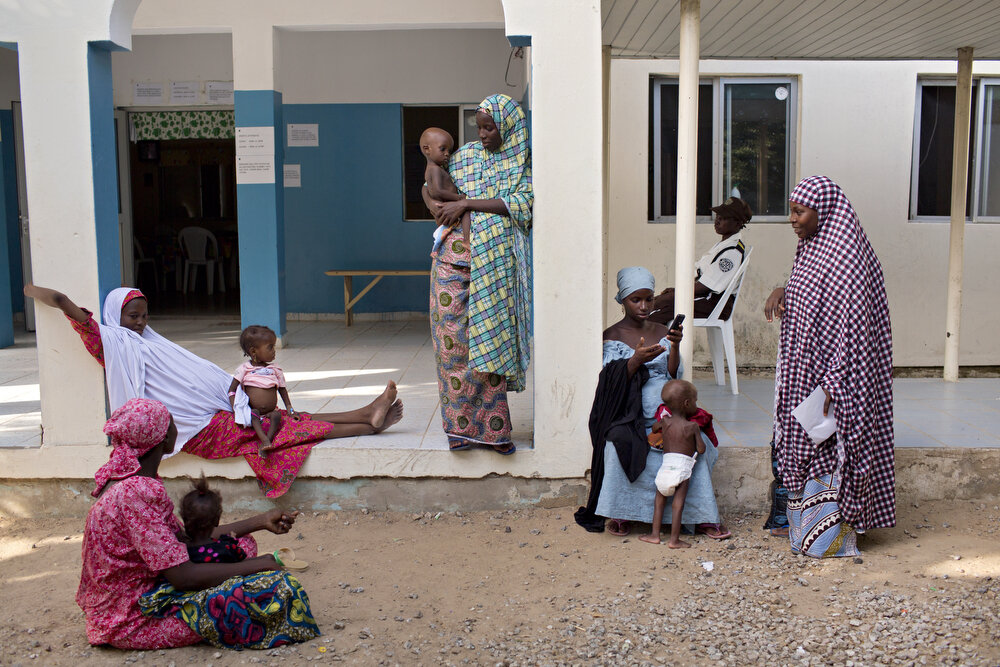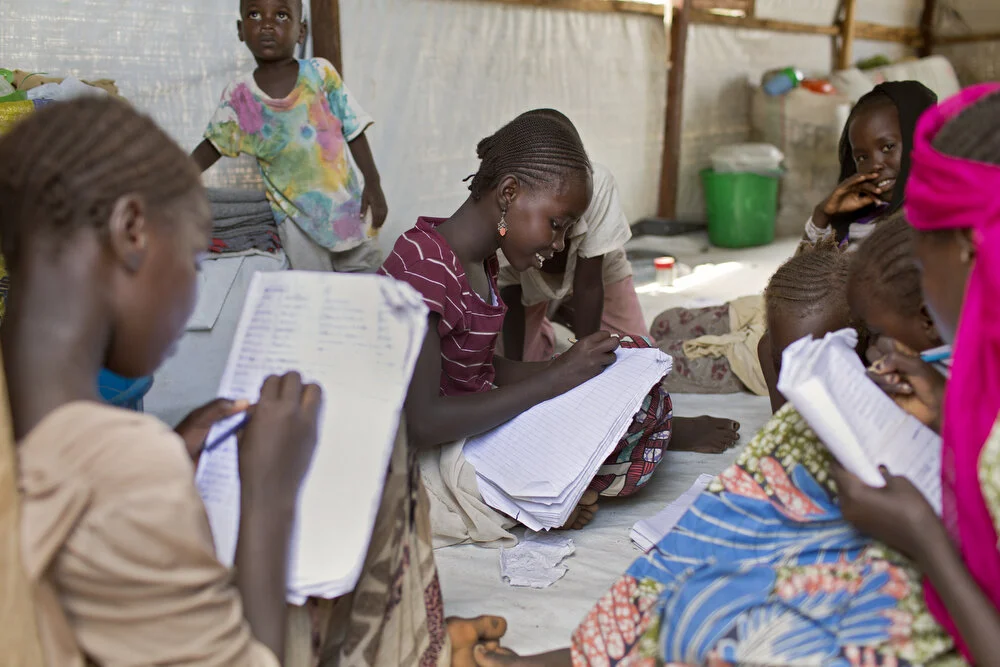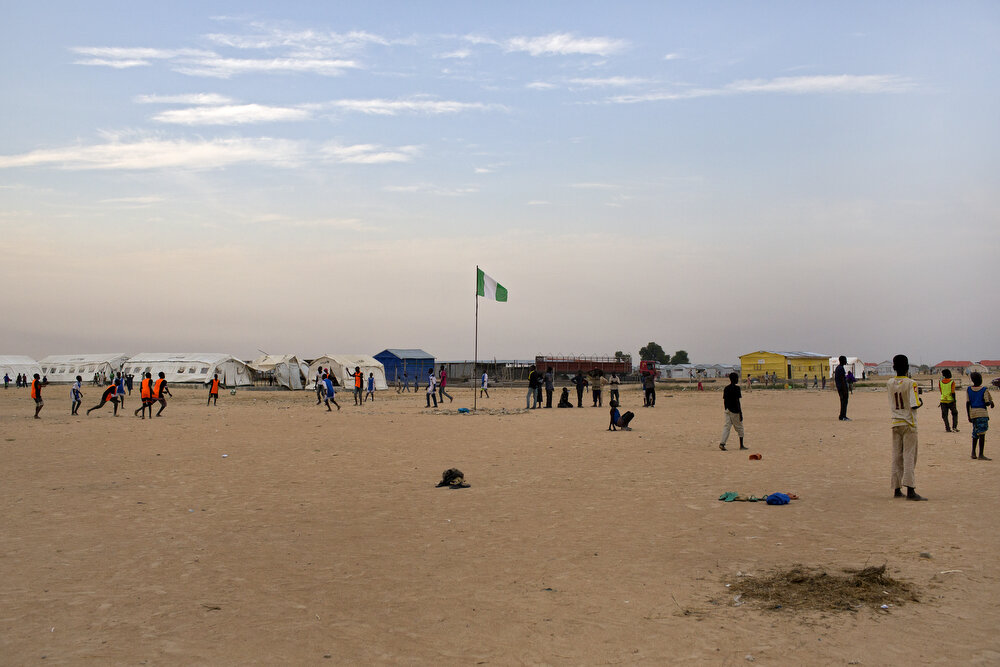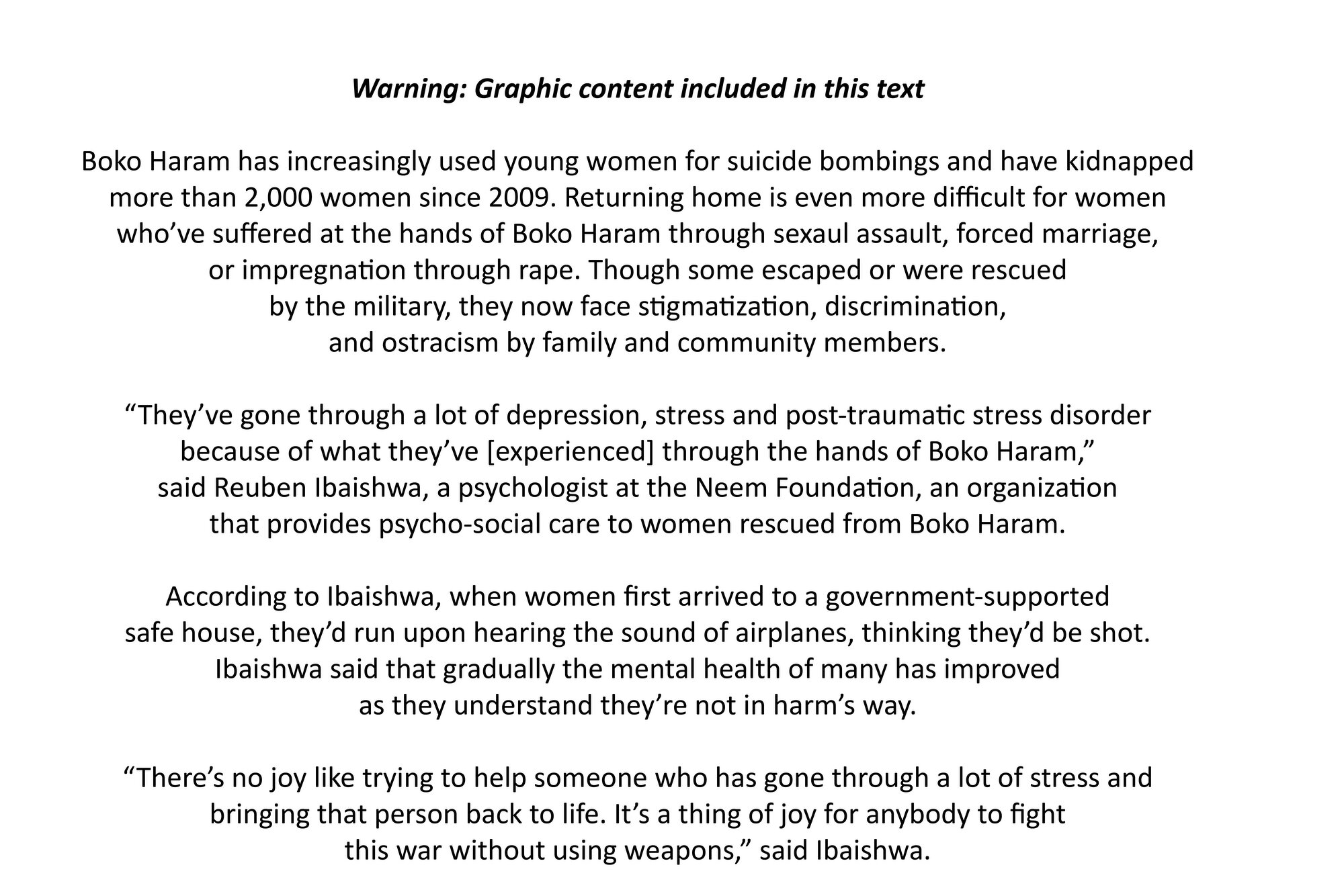An aerial view of an IDP camp in Monguno, Nigeria, a remote town that was recently reopened by the military after being occupied Boko Haram.
People in Michika, a town formerly occupied by Boko Haram in northeastern Nigeria, wait for a food distribution.
In Maiduguri's Borno State Specialist Hospital, a three-month old boy recovers from sustained wounds after a Boko Haram attack on the town of Dolori in which his mother was killed.
A man looks at a bomb blast site at the Jimeta Police Station in Yola, which was caused by bombs recovered from Boko Haram insurgents. Four police men were killed and more than 30 civilians were injured.
People walk towards the location of the food distribution in Michika, a town formerly occuped by Boko Haram.
A bridge on the road to the village of Michika in northern Nigeria's Adamawa State was damaged during the Boko Haram insurgency.
Women with their children who receive treatment for severe acute malnutrition at a Doctors Without Borders clinic in Maiduguri, Nigeria.
A young boy suffering form severe acute malnutrition is examined by a doctor at an International Rescue Committee stabilization center in Umaru Shehu Hospital in Maiduguri, Nigeria.
Women sign up for psychosocial services at an Internally Displaced Persons camp in Maiduguri, Nigeria.
Young boys collect wood from a trash pile that is being burned in Maiduguri, Nigeria.
People unload boxes of RUTFs, or ready-to-eat therapeutic foods, for children under five suffering from severe acute malnutrition, in Dikwa, Nigeria, a town formerly occupied by Boko Haram.
Nurses organize medication for patients at the Fufore IDP camp near Yola, Nigeria.
Maiduguri's Borno State Specialist Hospital has 33 beds and 29 were occupied by bomb blast and gun shot wound victims due to Boko Haram violence.
Hadiza Mohammad, 40, lies with her 4-year-old child who is being treated for severe acute malnutrition at a Doctors Without Borders clinic in Maiduguri, Nigeria. Hadiza fled to Maiduguri from her village of Gowza due to Boko Haram violence.
Women walk down a street in Yola, Nigeria, after a psychosocial program for women affected by Boko Haram violence.
Women from Bama, Nigeria, sew hats in the National Youth Service Corps IDP camp in Maiduguri where they have been living for 1 year and 7 months.
Children play on a swing set at Maiduguri, Nigeria's Bakassi IDP camp.
Students at a school for orphan children where many have a parent who was killed by Boko Haram.
Students at a school in Maiduguri, Nigeria, for orphan children where many have a parent who was killed by Boko Haram.
A young Christian and Muslim girl pose for a portrait in Michika, a town formerly occupied by Boko Haram in northeastern Nigeria.
A girl runs through an internally displaced persons camp in Dikwa, Nigeria, a town formerly occupied by Boko Haram.
An officer walks through a bomb blast site at the Jimeta Police Station in Yola, a city in northeastern Nigeria, which was caused by bombs recovered from Boko Haram insurgents. Four police men were killed and more than 30 civilians were injured.
Men recite both Islamic and Christian prayers before reconciliation meetings in Michika, a town formerly occupied by Boko Haram in northeastern Nigeria.
A woman feeds therapeutic foods to her child suffering from malnutrition in Maiduguri, Nigeria, during a community outreach drive sponsored by the International Rescue Committee.
A woman and her children living in an internally displaced persons camp in Monguno, Nigeria. Her youngest child, who sits in her lap, is currently being treated for severe acute malnutrition.
Women wait in line with their children during a community outreach drive sponsored by the International Rescue Committee to target severe acute malnutrition in Maiduguri, Nigeria.
Women leave a food distribution hosted by St. Theresa's Cathedral in Yola where many Internally Displaced People have fled due to Boko Haram violence.
Women talk outside an International Rescue Committee stabilization center that is treating children under five suffering from complications due to severe acute malnutrition in Maiduguri, Nigeria.
A newborn baby is being treated at an ICU clinic run by Doctors Without Borders in Monguno, Nigeria. The baby is suffering from severe acute malnutrition due to the fact that he hasn't been receiving breast milk because his mother recently died.
A woman walks with her child suffering from severe acute malnutrition through an International Rescue Committee stabilization center in Umaru Shehu Hospital in Maiduguri, Nigeria.
Women attending a psychosocial program for women affected by Boko Haram violence walk down in Yola, Nigeria.
Young girls read and write at at the Fufore IDP camp near Yola, Nigeria.
People play soccer around a Nigerian flag at Maiduguri, Nigeria's Bakassi IDP camp.
A woman sings with her baby during a psychosocial program sponsored by the International Rescue Committee at an Internally Displaced Persons camp in Maiduguri, Nigeria.
Women at a reconciliation meeting in Michika, a town previously occupied by Boko Haram in Adamawa state in northeastern Nigeria.
Students at a school in Maiduguri, Nigeria, for orphan children where many have a parent who was killed by Boko Haram.
Women pray before reconciliation meetings in Michika, a town formerly occupied by Boko Haram in northeastern Nigeria.
Halima Ibrahim, 30, was living under Boko Haram for nine months in Monguno after their village was attacked. The insurgents would threaten to kill them and would slaughter people in front of them as intimidation. After the military rescued them, she was able to escape to Maiduguri where she has been living in an IDP camp for more than one year where she lives with her children and husband, who she reunited with after he was able to initially escape the attack. Halima says the hardest part about living in the camps is the shortage of food and that her husband is not currently employed.
When Amina was 13, she was forced to marry a man who she later found out was a member of Boko Haram and divorced. Later she married another man who also turned out to be a Boko Haram insurgent. He kidnapped her and held her captive in an unknown location for seven weeks. She was able to escape and trekked on foot for days. She says that she has peace in the Safe House, that they’re secure, they can sleep well, and they’ve been fed well. For her future she hopes to go to school and to get married properly.
When Boko Haram attacked Gowza, Amina, 23, was kidnapped by the insurgents and lived with them in captivity for nine months. She was forced to marry one of the militants who had four wives and would only give them food four times a week. Amina’s 8-year-old son, who was kidnapped with her, died in captivity from starvation. Though the insurgent raped her, she was never impregnated. Now Amina lives with her husband in an IDP camp, but he doesn’t treat her well because he doesn’t understand that she was forced to marry an insurgent, that it was not by her will. Amina says that he has two wives, including herself, and that he only brings food for the other wife, leaving her and their other child with no option but to beg neighbors for food. She isn’t able to divorce because in their culture, divorce is only possible if the man accepts.
Zara, 19, was forced to move to Boko Haram's headquarter in Sambisa forest after her husband joined the insurgents when their daughter was two months old. At one point during captivity she was impregnated by him but then later lost the baby because he beat her after she was quarreling with his other wife. After that incident, she demanded a divorce, which she was granted after imams attempted to exorcise devils out of her to no avail.







